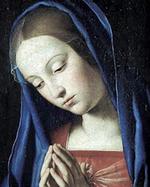Make your gift today!
Help keep Catholics around the world educated and informed.
Already donated? Log in to stop seeing these donation pop-ups.
Catholic Activity: Customs and Traditions of June 29, Solemnity of Saints Peter and Paul
Traditions and customs related to the feast of Saints Peter and Paul, June 29 from Father Francis X. Weiser, S.J.'s Handbook of Christian Feasts and Customs.
DIRECTIONS
According to ancient tradition these two Apostles were put to death by Emperor Nero (64). Peter died by crucifixion in the public circus or amphitheater at the Vatican hill; Paul was beheaded outside the city.
The special celebrations which the Christians in Rome held in honor of the "Princes of the Apostles" are known from earliest times. At the end of the fourth century the faithful thronged the streets on June 29 going in pilgrimage to the Vatican (Saint Peter's) and from there to the church of St. Paul's "outside the walls," praying at the shrines and attending the pontifical Mass which the pope celebrated first at St. Peter's, then at St. Paul's.
Since the great distance between the two churches made it quite inconvenient, for both the pope and the people, to perform the two services on the same morning, the liturgy of the feast was divided in the sixth century, and the Mass in honor of Saint Paul was henceforth celebrated on the following day. This "commemoration of Saint Paul" has remained a liturgical feast on June 30 ever since.
In both the Eastern and Western Churches the Feast of Peter and Paul was observed as a holyday of obligation from the fifth century on.4 It has remained so through all the centuries since.
Saint Peter is patron of fishermen and sailors, of key makers (because he carries the keys of the Kingdom) and watchmakers (because of the cock's crowing — an ancient time signal). He used to be invoked against fever (because Christ cured his mother-in-law from fever).5 Above all, however, he was highly venerated from the tenth century on as the heavenly gatekeeper who guards the gates of eternity and admits or turns away souls. This power, of course, is ascribed to him in connection with the "granting of the keys" by Christ and the power of "binding and loosening."
Another "patronage" shared by Peter and Paul seems to be taken from the ancient Germanic mythology of the gods Thor (Donar) and Woden. These two gods had been the leaders of the Germanic group of gods, but after conversion to Christianity the people invested Peter and Paul with the function of the "deposed" gods as far as nature is concerned. Thus Peter and Paul became the "weather makers." Many legends ascribe thunder and lightning to some activity of Saint Peter in Heaven (usually bowling). When it snows, he is "shaking out his feather bed." He sends rain and sunshine, hangs out the stars at night and takes them in again in the morning. Saint Paul is invoked against lightning, storms, hail, and extreme cold. It seems that he is entrusted with the task of persuading Saint Peter to do the "right things" regarding the weather.
Saint Paul alone is venerated as patron of tentmakers and weavers (having been one himself) and of theologians (because of his profound theological writings). Both Apostles have been invoked from ancient times against the bite of poisonous snakes. If you pray very hard on Peter and Paul's Day no snake will bite you all through the year, say people in many places even today.
Various flowers and herbs are under Saint Peter's patronage, especially those with a hairy stem. The "Peter's plant" (primula hirsuta) is collected, dried, and kept to be used as a medicine (in tea) against snake and dog bite. In Hungary, grains are blessed by the priest after Mass on Peter and Paul's Day. People weave crowns, crosses, and other religious symbols from straw, have them blessed, and carry them on wooden poles in procession around the church. Afterward they take them home and keep them suspended from the ceiling over the dinner table. Bread is also blessed in a special ceremony on this day in Hungary.
A moving custom is practiced in rural sections of the Alpine countries. On June 29, when the church bells ring the Angelus early in the morning, people step under the trees in their gardens kneel down and say the traditional prayer, the "Angel of the Lord." Having finished the prayer they bow deeply and make the sign of the cross, believing that on Saint Peter's Day the blessing of the Holy Father in Rome is carried by angels throughout the world to all who sincerely await it.
LITURGICAL PRAYER — O God, who has sanctified this day by the martyrdom of Thy Apostles Peter and Paul, grant that Thy Church may in all things follow their precepts, as she has received from them the beginnings of her faith.






